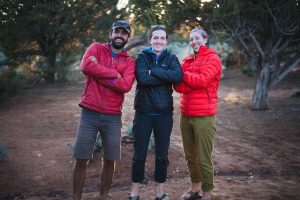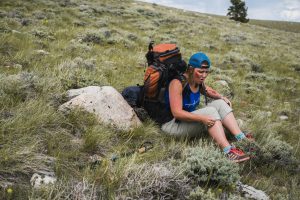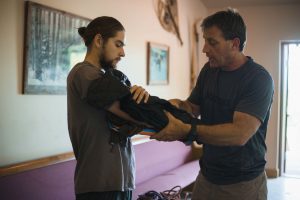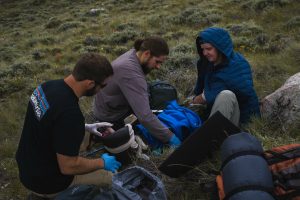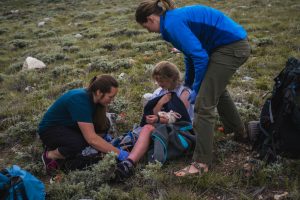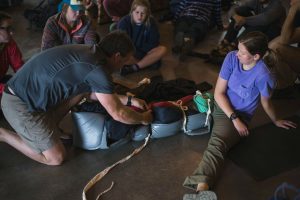What it is and why you need it
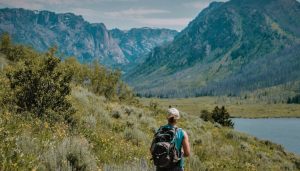
You meet up with some friends for coffee who you consider to be pretty legit outdoors-people. Jack and Jill seemingly “do it all” year-round. Throughout your conversation, they keep referring to this Woofer thing they just did. At first you smile and nod but then are confused because they don’t own a dog, and that sounds like a dog thing?
Jack goes on to brag about the sweet splint he made using his Crazy Creek chair, silk tie, puffy jacket and the remnants of last summer’s Power Bar! Your puzzled expression does not go unnoticed by Jill. She kindly explains that she and Jack just completed their Wilderness First Responder course (WFR pronounced “Wuf-Fer” in outdoor-ese).
They have enjoyed outdoor activities for years and largely experienced pleasant and safe outings. But recently they had a few close-calls and began thinking about all the “What Ifs”. They concluded they needed some more training. So they decided to get their WFR to better prepare themselves to respond in the event of an accident and gain knowledge to, hopefully, mitigate injury from happening to themselves and those they are with on future trips.
The WFR is largely seen as the industry standard for an outdoor professional and a mark of a committed outdoorsmen. If you are planning to spend any amount of time in the backcountry, especially if you want to work in the outdoor industry, I strongly urge you to obtain your WFR Certification. Spending time in the backcountry comes with inherent risks. From the weekend warrior to the after work mountain biker to the multi-week expedition leader, for outdoor lovers there is ample opportunity for various injuries and sickness to present themselves during your adventures.
How will you respond when you are miles from cell reception and help is hours away? A Wilderness First Responder has the skills needed to assess the safety of a scene, stabilize the patient, and implement a care and evacuation plan.
What is the Wilderness First Responder?
This course is typically between 7-10 days consisting of 70+ hours of interactive instruction and hands-on scenarios. Although some content is strictly lecture, by in large WFR courses rely heavily on experiential education and repetition. By the time you conclude your course you should be proficient in a wide range of basic medical and environmental skills.
The greatest distinguishing factor separating the Wilderness First Responder from your traditional Basic First Aid course is that you are taught long term care outside the urban “golden hour”. Extended contact time with your patient is common in a backcountry setting as it could take multiple hours to days (depending on location and severity of condition) to transport an injured or sick person to more estqablished care. Improvizing equipment is the other main difference from an urban First Responder course. Instead of all the equipment being all ready for you to use or coming in an ambulance you have to learn how to get creative and utilize the limited number of items that you have been carrying with you. Yet another added value to going through this course is teaching a broader way of thinking about items that we frequently only have one use for.
Remember you are their first line of help. Having the skills to if needed, and the knowledge to monitor them checking for trends in vitals or overall condition could prove invaluable in any setting.
Wilderness Medical Associates International describes the WFR course as:
“The definitive wilderness course in medical training, leadership, and critical thinking for outdoor, low-resource, and remote professionals and leaders.”
The Wilderness First Responder program is the ideal medical training for leaders in remote areas including outdoor educators, guides, military, professional search and rescue teams, researchers, and those involved in disaster relief…. It includes the essential principles and skills required to assess and manage medical problems in isolated and extreme environments for days and weeks if necessary. If you are already a medical professional you can also earn Continuing Education Hours for your WFR Course.
Why should I get certified as a WFR?
If you are planning to spend any amount of time in the backcountry I strongly urge you to obtain your WFR Certification. Moreover if you want to work in the outdoor industry being WFR certified is increasingly becoming a standard requirement to operate in a guiding position especially. If you are already a medical professional an added perk is that you can earn Continuing Education Hours for your WFR Course.
You may be asking yourself, “If this is the standard for professionals why would it benefit me? I just enjoy going outside with my dog for a hike and the occasional trail run with friends. WFR seems like overkill!”
This may be a fair assessment. The WFR is designed to give specific training for wilderness leaders who are on multi-day backcountry trips. If you aren’t planning to ever be more than a few miles from a road then the less intensive Wilderness First Aid or Wilderness Advanced First Aid may be more appropriate to give you sufficient training to care for more minor medical emergencies.
Wilderness First Responder is a certification with far reaching value. The skills learned through this course can be used on a daily basis and may one day save someone’s life. What’s keeping you from getting trained?
Check out our Wilderness First Responder course offering here.
Sources:
Tilton, Buck. “Wilderness First Responder: How to recognize, treat, and prevent emergencies in the backcountry.” Morris Book Publishing, LLC. Guilford, CT. 2010
National Outdoor Leadership School (NOLS) Wilderness Medicine
Wilderness Medicine Training Center
Wilderness Medical Associates International
